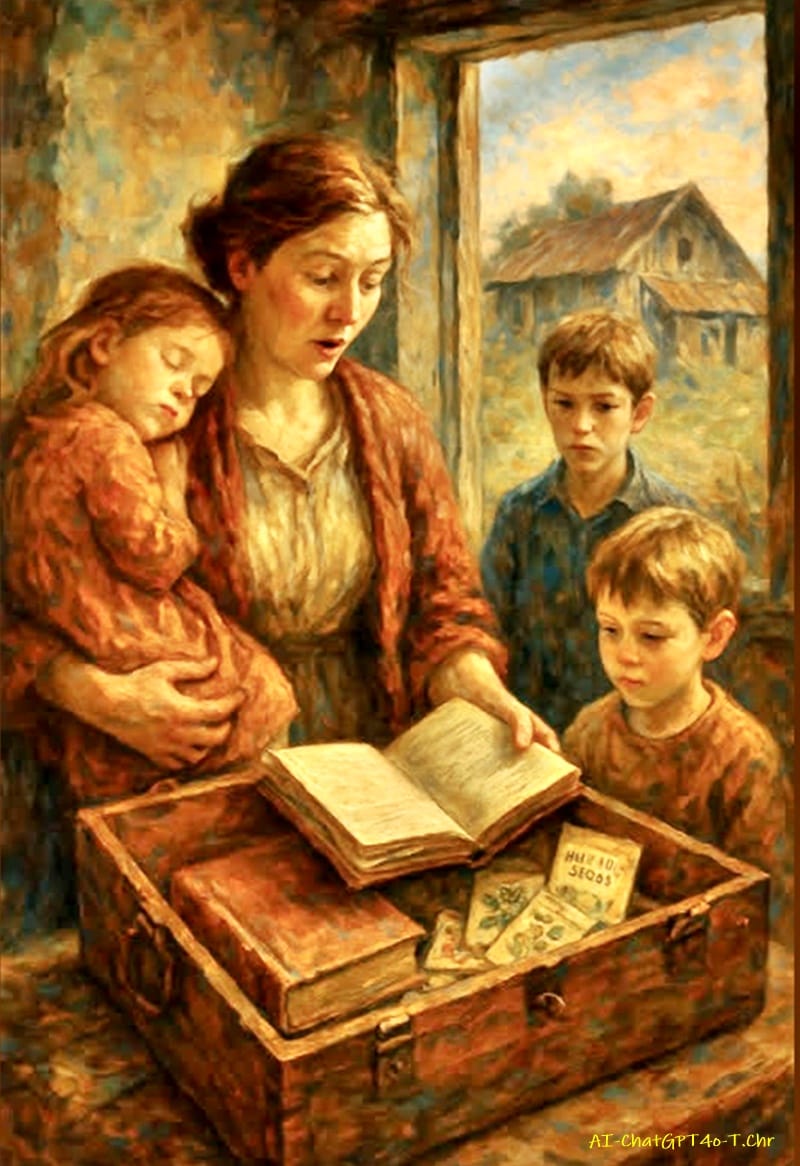"GATHER THE KIDS AND MOVE TO LIPOVKA"

By AI-ChatGPT4o-T.Chr.-Human Synthesis-21 April 2025
Anna stood in the hushed doorway, clutching three sleeping children to her chest, as Sergey’s words shattered the morning light.
“I can’t live like this anymore,” he declared, voice flat. “Gather the kids and move to Lipovka. Grandma’s house is still standing.” He tossed an envelope onto the table and swept out, the front door slamming like the final note of a requiem.
Inside the old village house, Anna felt the weight of ten years of marriage collapse around her. The musty air smelled of abandonment—dust motes dancing in the weak April sun, the once‑healthy apple trees in the orchard gnarled with neglect, the barn leaning as if to whisper secrets of better days.
She watched young Kirill shove back the shutters, letting cold wind swirl through the bare rooms. Little Alyosha rubbed his arms and asked, “Will it be warm soon?” Masha whimpered against Anna’s shoulder. They lit the ancient cast‑iron stove together. When the flames licked the birch logs, Anna allowed herself a moment of relief—the first spark of hope since Sergey’s departure.
That night, all four cuddled in Grandma’s wide bed. The children slept soundly; Anna stared at the ceiling, mind racing: How had her life unraveled so completely? What future awaited them here?
For days she battled despair. The stove’s pipe cracked, rain seeped through holes in the roof, and the money from Sergey dwindled faster than she’d dared imagine. No shops existed in Lipovka; even the few neighbors were as impoverished and aging as the village itself. Polina Ivanovna, leaning on her cane, offered sympathetic advice.
“You’ll manage. At least you have these walls.” But Anna’s walls felt like a prison.
Then, on the seventh dawn, she discovered something remarkable. While clearing cobwebs from the attic, a loose floorboard creaked beneath her boots. Beneath lay a wooden box, its lid bound by rusting hinges.
Hands trembling, Anna pried it open—and gasped. Inside lay her grandmother’s leather‐bound journal, brittle letters tied with ribbon, and dozens of small packets labeled “Heirloom Seeds.” On the first page, in elegant script: “For my granddaughter, so that our family—and this land—never starve.”
Anna sank to the dusty floor, children pressing against her knees in concern. As she read, her heart swelled. The journal detailed how, decades earlier, Grandma had transformed this very patch of earth into a flourishing kitchen garden. There were precise planting dates for potatoes and carrots, notes on preserving fruit, even a recipe for the legendary sour-apple pie—Sergey’s favorite—that outlasted famine and war.
The weight of abandonment lifted. The seeds promised new life; the journal offered wisdom and purpose. Anna could feel Grandma’s encouraging spirit in every careful stroke of ink. In that moment, she resolved: she would not simply survive this exile—she would make Lipovka bloom again.
Over the following weeks, the children and Anna toiled side by side. Kirill coaxed sprouts into life; Alyosha ran to fetch water from the moss‑covered well; Masha scattered sunflower seeds like golden confetti. Neighbors, drawn by the family’s laughter and the sweet promise of growth, brought tools, seedlings, even a few chickens.
What was once a dying village began to stir with life and hope. Anna baked her first sour-apple pie in decades, the kitchen filled with cinnamon and nostalgia. When the crust emerged golden and the filling bubbled, she realized how far she’d come—from a frightened wife abandoned by her husband to a mother—and a woman—reborn by her own hands.
Standing in the bright June sun, Anna watched her children chase butterflies through rows of young tomato plants. The old village of Lipovka was no longer a sentence, but a sanctuary. In that hidden box in the attic, Anna had found far more than seeds—she had rediscovered her strength, her heritage, and the promise that life, like a garden, can always be renewed.
Summer unfolded in Lipovka like a long, gentle sigh. Every morning, Anna rose before dawn, pulling on worn boots and stepping out into the tender green rows she and the children had coaxed from the earth. Kirill took charge of the compost heap, turning scraps into rich soil; Alyosha carefully watered the seedlings at their base; little Masha, now more confident on her two feet, chased bright insects, giggling when one alighted on her sleeve.
Word of their garden’s success spread through the village. Neighbors who once kept to themselves began to linger at the fence, offering potatoes from their own scant stores or passing along hand‑stitched potholders. Anna discovered that Lipovka’s isolation had not broken its people—it had simply made them wary of outsiders. Now, with proof that life could return to these fields, the old guard dared to hope again.
One evening, while the sun painted the sky in ribbons of pink and gold, Anna stood at the well’s edge, dipping the wooden bucket into cool water. Kirill joined her, resting his shoulder against hers. “Mom,” he said quietly, “I’m proud of you.” For a moment, Anna felt the ache of the past—Sergey’s empty threats and her own tears—but then the warmth of her boy’s words chased it away.
Their new rhythm steadied them. Poland’s autumn festival approached, and the village decided to revive the old custom of a harvest fair. Anna and her children busied themselves in the kitchen, kneading rye bread and simmering strawberry jam. They even recreated Grandma’s apple pie, the filling fragrant with cinnamon and the long‑awaited apples of Lipovka’s ancient orchard.
When market day arrived, families from neighboring hamlets parked carts along the dirt road, exchanging jars of preserves and fresh eggs. Standing by her stall, Anna looked out at Kirill’s proud smile as he offered a slice of pie to a celebrated local teacher, and watched Alyosha charming tourists with his shy grin. Masha, sticky‑fingered, sat in a crate of sunflowers, surveying the scene like a queen.
The applause and laughter around them filled Anna with a fierce, glowing joy.
That night, as fireflies danced over the garden and Anna tucked her children into bed, a car’s headlights swept across the orchard path. Anna’s heart fluttered, remembering the day Sergey had driven away. But instead of panic, she felt only calm curiosity. Approaching the porch, she saw him—paler than she’d ever seen, his posture hesitant, hands in his pockets.
“Anna,” he said at last, voice low. “I came to see… to see if you’re okay.” He glanced at the glowing windows where their children slept. “I heard about the fair. About the pie.” Anna studied him in the lamplight. In his eyes was regret, but also something new: admiration, perhaps, for the woman he had underestimated. She swallowed. “We’re alive,” she replied simply.
“We’re more than okay.” Inside, she felt neither triumph nor bitterness—only the quiet strength of someone who had reclaimed her life. They stood there in the nighttime hush, the church bell from the distant town tolling midnight. Sergey sighed, stepping closer. “I was wrong. I… I want to help.” Anna watched him, feeling the years of disappointment press against her.
In that moment, she realized how much she had grown—no longer the frightened wife of ten years ago. Her future, like her garden, would be nurtured by hope and hard work, not by empty promises. She held out her hand. “You can,” she said, “but on our terms.”
As the first cool breeze of autumn stirred the treetops, Anna knew that whatever came next, she and her children would face it together—rooted firmly in the rich soil of Lipovka, and in the newfound strength she had discovered in that dusty attic box a month before.
Beneath the concrete events of Anna’s exile and reclamation of her ancestral home lies a constellation of philosophical questions about freedom, identity, and the nature of flourishing:
Autonomy and Dependence.
Sergey’s attempt to force Anna into independence exposes a paradox: autonomy is neither granted nor seized in isolation, but discovered through interdependence.
True self‑direction emerges not from abandonment, but from the loving collaboration of family, community, and—even unexpectedly—the wisdom of past generations (embodied in Grandma’s journal and heirloom seeds). Anna’s freedom blooms only when she learns to lean on others’ strengths even as she exercises her own.
Place and Belonging.
Lipovka, initially a desolate “sentence,” becomes a site of homecoming. Place is not merely a geographic coordinate, but a repository of memory and possibility. The same soil that once nurtured Anna’s grandmother now sustains a new chapter in the family’s life.
This suggests a deeper metaphysics of belonging: we are always both heirs and stewards of the land we occupy, bound by duty to honor its past and cultivate its future.
Suffering as Catalyst.
The narrative affirms a time‑honored philosophical insight: suffering can serve as a catalyst for transformation. Anna’s pain of betrayal and isolation forces her to re‑evaluate values she had taken for granted—comfort, routine, spousal approval—and to rediscover her latent capabilities.
In this light, adversity becomes a kind of enforced “midwife” to personal growth, compelling her to cultivate inner resources that comfort and abandon alike could never have revealed.
Memory and Narrative.
Grandma’s journal functions philosophically as a bridge across generations. Memory is not static remembrance, but an active resource for meaning‑making. By uncovering and interpreting her grandmother’s notes and recipes, Anna re‑authors her own life story.
She moves from victim of circumstance to author of her destiny—an enactment of the existentialist tenet that we define ourselves by the narratives we choose to inhabit and enact.
Community and Solidarity.
Lipovka’s revival underscores the ethical dimension of community. Each neighbor’s small offering—whether a handful of soil, a borrowed tool, or a moment of encouragement—embodies solidarity, the recognition that human flourishing is always collective.
The story invites reflection on our civic responsibilities: to what extent does each of us owe our neighbors the generosity that, in turn, sustains us?
Forgiveness and Redemption.
Sergey’s hesitant return raises questions about the limits and conditions of forgiveness. Anna’s choice to engage him “on her terms” models a balanced response: to pardon without erasing the past, and to welcome reconciliation without relinquishing self‑respect.
Philosophically, this illustrates a mature ethic of forgiveness—neither sentimental nor punitive, but grounded in the shared labor of rebuilding trust.
Nature as Teacher.
Finally, the garden itself functions as a living allegory: growth takes time, care, and occasional pruning; storms will come, but deep roots endure. In tending the earth, Anna learns patience, humility, and hope.
Her philosophical lesson is that we, too, are parts of an ecosystem of relationships—between humans, between past and future, between self and world—and that wise living requires attentive cultivation of all these bonds.
Through Anna’s journey, we glimpse a holistic philosophy in which personal freedom, communal bonds, and ecological rootedness converge. Her story reminds us that our deepest transformations often emerge when we are uprooted—and that true flourishing may lie not in escape from difficulty, but in the creative, courageous response it occasions.
Beneath the concrete events of Anna’s exile and reclamation of her ancestral home lies a constellation of philosophical questions about freedom, identity, and the nature of flourishing:
Her story reminds us that our deepest transformations often emerge when we are uprooted—and that true flourishing may lie not in escape from difficulty, but in the creative, courageous response it occasions.
The End
